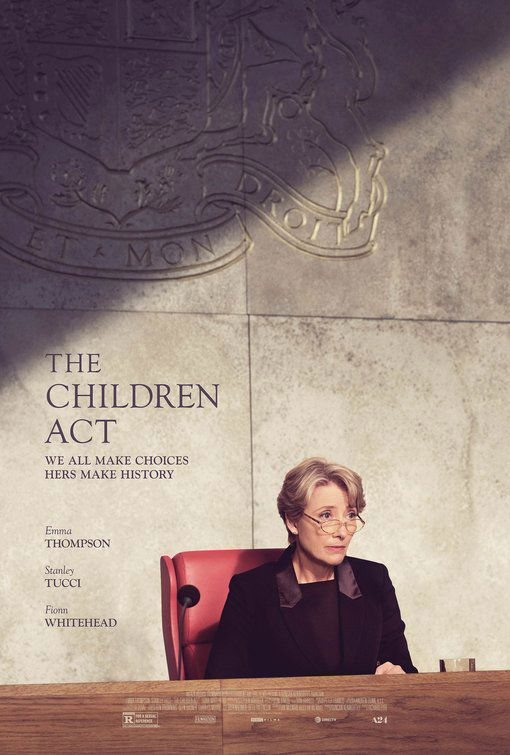"British Judge Makes Life or Death Decisions"
What You Need To Know:
Title: THE CHILDREN ACT
Quality: * * Acceptability: -2
SUBTITLES: None
WARNING CODES:
Language: L
Violence: V
Sex: S
Nudity: None
MPAA RATING: R
RELEASE: September 14, 2018
TIME: 105 minutes
STARRING: Emma Thompson, Stanley Tucci, Ben Chaplin, Fionn Whitehead, Rosie Cavaliero
DIRECTOR: Richard Eyre
PRODUCERS: Duncan Kenworthy
EXECUTIVE PRODUCERS: Glen Basner, Ben Browning, Charles Moore, Joe Oppenheimer, Beth Pattinson
WRITER: Ian McEwan
BASED ON THE NOVEL BY: Ian McEwan
DISTRIBUTOR: A24 Films
GENRE: Drama
INTENDED AUDIENCE: Adults
REVIEWER: Sarah Murphree
REVIEW: In THE CHILDREN ACT, high court judge Fiona Maye in England has a lot on her plate. She works tirelessly in and out of the courtroom to bring justice to those that are suffering. At the beginning of the movie, she’s forced to make a tough choice about two conjoined twins. She comes home from work exhausted, but continues to work while barely acknowledging her husband. At first, it appears this is necessary for this particular case, but as the movie progresses the audience learns this is the norm in Fiona’s life. Work, go home and work some more.
Her husband constantly asks her to go out on a date with him, but she refuses. She has work. Her husband approaches her one evening and informs her he’s going to have an affair with his co-worker. Fiona, reserved and always put together, doesn’t show much emotion about his confession. She doesn’t even try to stop him from doing it. She simply tells him if he goes through with it, he’s not welcome back home. The husband leaves and goes through with the illicit act.
Shortly after this, Fiona receives another challenging case where she’s forced to make a decision about the life or death of a 17-year-old boy. Adam Whitehead is dying of leukemia in the hospital and apparently needs a blood transfusion to survive, but his parents are fierce Jehovah’s Witness believers who oppose such treatment. The boy, portrayed as young and naïve, is convinced this is the right decision too. Fiona is horrified by the drastic beliefs of this religious group.
Meanwhile, her husband returns home after having his affair. Fiona breaks down and yells at him, finally unveiling her true emotions. She’s hurt and never wants to see him again. The husband explains she left the marriage years ago, and he only left it two days ago.
Fiona distracts herself with work and ignores her husband’s desire to talk through their situation and seek help. She goes to visit Adam in the hospital and tries to persuade him to go through with the blood transfusion. She stays in the hospital and sings with the boy while he plays guitar with her. It’s not typical for a busy judge to give anyone involved in a case this much attention, and it appears as if Fiona may have some sort of feelings for the 18-year-old. This is when the story takes a bizarre turn and heads down a path towards odd behaviors and unbelievable situations.
The boy agrees to go through with the blood transfusion. He survives the operation and develops a strange obsession with Fiona. He calls her obsessively, leaves her voicemails, writes her letters, and shows up at her work place. He is so grateful she was the voice that demanded he live, and he now wants to be with her constantly. He even asks if he can live with her. Fiona says no, but something in her constant hesitation and willingness to sit and listen to him conveys an odd sort of sexual tension. Meanwhile, Fiona and her husband, Jack, start to try working things out between them, and Adam’s leukemia returns.
Can Fiona and Jack save their marriage? Will Adam survive his remission?
THE CHILDREN ACT is a dark, slow, artistic movie. With long-winded takes of Fiona playing dramatic piano music throughout the running time, this is certainly a screening intended for adults who fancy independent movies. Although Emma Thompson blows it away with her acting, the movie’s plot becomes strange and unbelievable when the teenage boy develops a fixation on the female judge. The judge partly succumbs to the boy’s romantic obsession for one brief moment, but pulls back. The way she does it, however, results in loss, tragedy and sadness.
THE CHILDREN ACT has a strong humanist worldview where amoral government replaces religious faith, including both false and true religious faith, as the final arbiter of things. Of course, the Jehovah’s Witness cult portrayed in the movie is filled with heretical teachings, but the movie seems oblivious to this problem. So, it doesn’t seem fair when it turns the Jehovah’s Witness characters into average, normal examples of religious faith.
THE CHILDREN ACT warrants extreme caution, despite Emma Thompson’s excellent performance.
Please send your thanks or concerns, and copy us, to:
David Fenkel
A24 Films
601 West 26th Street, Suite 1740
New York, NY 10001
Phone: (646) 568-6015; Website: www.a24films.com
SUMMARY: THE CHILDREN ACT is a story about a children’s judge in Britain and the judicial decisions she must face while she deals with personal problems with her husband, who’s upset about how she neglects him for her work. THE CHILDREN ACT is a dark, slow, artistic drama, with a strong humanist worldview where amoral government replaces religious faith, including both false and true religious faith, as the final arbiter of all things.
IN BRIEF:
THE CHILDREN ACT, based on a British novel, is a dramatic story about the pressures Fiona Maye must deal with due to her position as a high court judge in family court. While Fiona worked tirelessly to bring justice to the truth, her marriage has suffered. Fed up, her husband decides to have an affair, while she clings to work and focuses all her time on a court case about a 17-year-old boy with leukemia. Adam has refused a blood transfusion because of his religious beliefs as a Jehovah’s Witness.
THE CHILDREN ACT is a dark, slow, artistic movie. With long-winded takes of Fiona playing dramatic piano music throughout the movie, this is a screening intended for adults who fancy independent movies. Emma Thompson blows it away with her acting, but the movie’s plot becomes strange and unbelievable when this likeable judge develops feelings for an 18-year-old leukemia patient who becomes fixated on her. THE CHILDREN ACT has a strong humanist worldview where amoral government replaces religious faith, including both false and true religious faith, as the final arbiter of all things.
Content:
More Detail:
In THE CHILDREN ACT, high court judge Fiona Maye in England has a lot on her plate. She works tirelessly in and out of the courtroom to bring justice to those that are suffering. At the beginning of the movie, she’s forced to make a tough choice about two conjoined twins. She comes home from work exhausted, but continues to work while barely acknowledging her husband. At first, it appears this is necessary for this particular case, but as the movie progresses the audience learns this is the norm in Fiona’s life. Work, go home and work some more.
Her husband constantly asks her to go out on a date with him, but she refuses. She has work. Her husband approaches her one evening and informs her he’s going to have an affair with his co-worker. Fiona, reserved and always put together, doesn’t show much emotion about his confession. She doesn’t even try to stop him from doing it. She simply tells him if he goes through with it, he’s not welcome back home. The husband leaves and goes through with the illicit act.
Shortly after this, Fiona receives another challenging case where she’s forced to make a decision about the life or death of a 17-year-old boy. Adam Whitehead is dying of leukemia in the hospital and apparently needs a blood transfusion to survive, but his parents are fierce Jehovah’s Witness believers who oppose such treatment. The boy, portrayed as young and naïve, is convinced this is the right decision too. Fiona is horrified by the drastic beliefs of this religious group.
Meanwhile, her husband returns home after having his affair. Fiona breaks down and yells at him, finally unveiling her true emotions. She’s hurt and never wants to see him again. The husband explains she left the marriage years ago, and he only left it two days ago.
Fiona distracts herself with work and ignores her husband’s desire to talk through their situation and seek help. She goes to visit Adam in the hospital and tries to persuade him to go through with the blood transfusion. She stays in the hospital and sings with the boy while he plays guitar with her. It’s not typical for a busy judge to give anyone involved in a case this much attention, and it appears as if Fiona may have some sort of feelings for the 18-year-old. This is when the story takes a bizarre turn and heads down a path towards odd behaviors and unbelievable situations.
The boy agrees to go through with the blood transfusion. He survives the operation and develops a strange obsession with Fiona. He calls her obsessively, leaves her voicemails, writes her letters, and shows up at her work place. He is so grateful she was the voice that demanded he live, and he now wants to be with her constantly. He even asks if he can live with her. Fiona says no, but something in her constant hesitation and willingness to sit and listen to him conveys an odd sort of sexual tension. Meanwhile, Fiona and her husband, Jack, start to try working things out between them, and Adam’s leukemia returns.
Can Fiona and Jack save their marriage? Will Adam survive his remission?
THE CHILDREN ACT is a dark, slow, artistic movie. With long-winded takes of Fiona playing dramatic piano music throughout the running time, this is certainly a screening intended for adults who fancy independent movies. Although Emma Thompson blows it away with her acting, the movie’s plot becomes strange and unbelievable when the teenage boy develops a fixation on the female judge. The judge partly succumbs to the boy’s romantic obsession for one brief moment, but pulls back. The way she does it, however, results in loss, tragedy and sadness.
THE CHILDREN ACT has a strong humanist worldview where amoral government replaces religious faith, including both false and true religious faith, as the final arbiter of things. Of course, the Jehovah’s Witness cult portrayed in the movie is filled with heretical teachings, but the movie seems oblivious to this problem. So, it doesn’t seem fair when it turns the Jehovah’s Witness characters into average, normal examples of religious faith.
THE CHILDREN ACT warrants extreme caution, despite Emma Thompson’s excellent performance.



 - Content:
- Content: 




